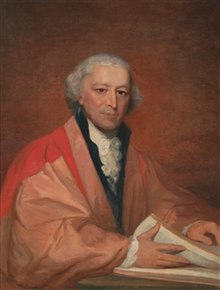William Samuel Johnson
Johnson received his primary education from his father who ran a small Stratford Academy boarding students.
Self-educated in the law, he quickly developed an important clientele and established business connections extending beyond the boundaries of his native colony and was frequently consulted on inter-colony legal issues.
At this time he was somewhat of a radical, writing about “chains and shackles,” “stamps and slavery,” and the “late fatal acts” that would reduce America to “Roman provinces in the time of the Caesar.”[3] He started forming alliances with the Connecticut Son's of Liberty and working against the re-election of Loyalist Governor Thomas Fitch.
[8] The declaration, petitions, and pressure from London merchants forced Parliament to repeal the Stamp Act in 1766.
Johnson left his family, his political career, and his legal practice to argue in London for Connecticut's charter, where he lived from 1767 to 1771.
The English author Samuel Johnson said of him, "Of all those whom the various accidents of life have brought within my notice, there is scarce anyone whose acquaintance I have more desired to cultivate than yours.
He enjoyed close associations with the Anglican Church in England and with the scholarly community at Oxford, which awarded him an honorary degree in 1766.
Fearing the consequences of independence for both the colonies and the mother country, Johnson sought to avoid extremism and to reach a compromise on the outstanding political differences between the protagonists.
He succeeded, but on returning back across the lines again to Connecticut, he found the Assembly had changed their mind, voted for war, then adjourned, leaving no instructions for Johnson.
[12] He declined to undertake yet another dangerous mission he opposed, but a town meeting was called and resolutions were passed insisting he should visit Tyron.
He resumed the practice of his profession, and some time subsequent to the declaration of peace was reinstated in his old office as a member of the Upper House of the General Assembly,[13] where he also served as a legal counsel for Connecticut in its dispute with Pennsylvania over western lands (1779-80).
He looked to a strong federal government to protect the rights of Connecticut and the other small states from encroachment by their more powerful neighbors.
In her 1966 book, Miracle at Philadelphia, Catherine Drinker Bowen calls Johnson "the perfect man to preside over these four masters of argument and political strategy [i.e. fellow committee members Alexander Hamilton, Gouverneur Morris, James Madison, and Rufus King].... His presence on the committee must have been reassuring; the doctor's quiet manner disarmed.

